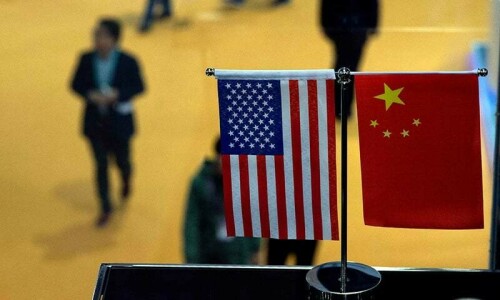ISLAMABAD: Tax exemptions enjoyed by industrialists, feudal lords and companies rose by a staggering 99 per cent during this fiscal year, at a time when the Federal Board of Revenue (FBR) has witnessed a shortfall of Rs200 billion in revenue collection.
The exemptions now amount to Rs477.1bn — nearly 2pc of the country’s gross domestic product (GDP) in fiscal year 2013-14 — compared to Rs239.535bn in the last year, an increase of Rs237.57bn.
The finance minister said on Monday the exemptions given through Statutory Regulatory Orders (SRO) will be phased out in three years. He said most part of the exemptions will go in the upcoming budget.
The total cost of exemptions was Rs205.92bn in the year 2011-2012.
An SRO, an executive order which grants tax exemptions to an individual, industry or sector, is issued on the directive of the finance minister, the cabinet’s economic coordination committee or on FBR’s proposal.
Income tax exemptions: An amount of Rs96.634bn was lost due to exemptions in income tax in 2013-14, an increase of Rs14.25bn (17.3 pc) from Rs82.393bn in the year 2012-13.
Independent Power Producers (IPPs) were given income tax exemption of Rs52.03bn, a hike of R3.43bn over last year when exemptions stood at Rs48.6bn. In 2010-11, income tax exemptions were Rs0.870bn for IPPs, reflecting a substantial increase in the past three years.
Boards of education, universities and computer training institutes also remained major beneficiaries of income tax exemptions which stood at Rs11.1bn in 2013-14, followed by another Rs18bn to various enterprises, which were not disclosed in the survey. Under these two heads of exemptions an increase of Rs2.08bn and Rs3bn was witnessed this year.
Exemptions on account of capital gains increased to Rs5bn in 2013-14 from Rs4bn in the previous year.
The cost of exemption on profits on debt/interest from government securities and certain foreign currency accounts/ books profit on debt increased by Rs2.1bn to Rs4.1bn this year from Rs2bn last year.
Sales tax exemptions: The FBR has worked out sales tax exemptions at Rs249bn this year as against Rs37.436bn last year, a rise of Rs211.564bn (565.14pc). However, this amount does not include those exemptions which cannot be calculated, for example, exemption on raw vegetables, tandoori roti, etc.
In the previous year’s survey, the Rs37.436bn sales tax exemptions were mentioned because of tractors, pharmaceuticals, and sugar. The partial exemption on sugar, which mostly benefits a handful of political families and ranges between Rs12bn and Rs20bn, was not disclosed in the survey this year.
The cost of sales tax on three export facilitation schemes was calculated at Rs19bn in 2013-14. Of these SRO450 (1)/2011 costs Rs14bn, followed by SRO492(I)/2009 of Rs4bn and SRO326(I)2008 of Rs1bn, respectively. Much higher is the quantum of sales tax exemption on six general and sector-specific SROs which cost Rs230bn to the kitty in 2013-14.
Further break-up shows that the zero per cent sales tax on specific goods under SRO549(I)/2008 cost government a loss of Rs94bn; followed by Rs65bn cost because of concessionary rate of sales tax on raw materials, intermediary inputs and finished goods related to five sectors—textile, carpets, leather, sports and surgical sectors.
The cost of SRO575(I)2006 is Rs30bn on machinery, equipment, apparatus and items of capital goods, followed by Rs26bn because of exemption from sales tax on import and supply of certain products under SRO551 (I) 2008.
Customs exemptions: The customs exemptions surged to Rs131.451bn because of the preferential trade agreements that Pakistan signed in the recent past and other duty exemptions this year from Rs119.706bn in the previous year, an increase of 9.82 pc (or Rs11.75bn).
The break-up of the customs losses showed that maximum exemptions in customs duties available on imports from China under free trade agreement, which reached Rs21.464bn in the outgoing fiscal year from Rs19.932bn last year, increased by 7.73pc.
The cost of exemption on imports from Saarc and ECO countries stood at Rs290 million, FTA with Sri Lanka at Rs732.6m, PTA with Iran Rs22.3m, Safta agreement Rs796.2m, from Mauritius Rs3.4m, from Malaysia Rs2.909bn; and Indonesia at Rs1.508bn.
Other major beneficiaries of these exemptions were the original equipment manufacturers (OEMs) of the automotive sector and vendors who availed Rs29.30bn exemptions in 2013-14 and general and conditional exemption of customs duty (non-survey) under SRO567(I)2006 costs Rs32.515bn; followed by Rs21.780bn because of exemption from customs duty and sales tax on import of specified machinery, equipment, apparatus and items under SRO575(I)2006.
Published in Dawn, June 3rd, 2014














































